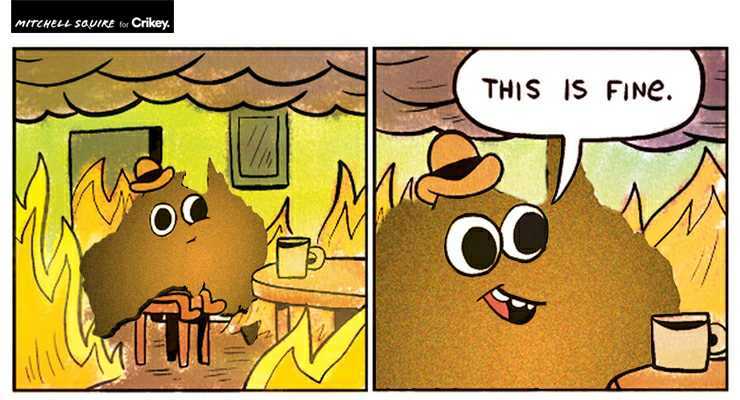Before it is anything else, the Morrison government’s failure in the vaccine rollout is somewhat bewildering.
There are some who are arguing that this debacle is deliberate — for what reason, I don’t fully understand. I am always up for a conspiracy theory, so if any evidence is available, send it on. In the absence of such, however, I’ll continue to believe in the stuff-up.
Morrison gained points for his “mid-period” handling of COVID-19 (after the early debacle, and before the current debacle) with the national cabinet model; that effectiveness can now be seen as largely the product of state governments.
Left to its own devices, the federal government has shown every feature with which we have come to be familiar: clownish incompetence, including a giveaway privatisation tender bonus, followed up with slick PR.
Can this absolute disaster finally be breaking through, in the general public’s view of the Morrison government? It’s very hard to say, although the nature of the debacle should make it so. This is the most basic failure in a government’s duty, to ensure public safety against capricious or unneccessary suffering.
Yet the very nature of COVID-19 has tended to hold off the full reality of the pandemic. The fact that it overwhelmingly affects the very old, with not many years left, and the disabled and chronically ill, who are “pre-marginalised”, has held off the full force of this challenge to life, and the seriousness of the Morrison government’s failure to address it.
COVID-19 is a rehearsal for a catastrophe — the next pandemic, the one that doesn’t discriminate in its victims. Indeed, the new COVID variants are a first instalment of this; the so-called “Indian variant” has an R number of six, a substantial jump in its ability to infect, compared to earlier strains.
What has not changed, thankfully, is its lethality profile, which appears to be relatively set.
Perhaps that is why there is no general air of crisis with regard to these new developments and failures. Even in Melbourne, where the slow rollout has contributed to what is likely to be a fortnight-long lockdown, there is no sense of palpable anger, so far as one can tell. If anything, there’s a sort of Dunkirk spirit taking over, although I suspect this varies from area to area.
Are we getting used to this? Are some of us starting to enjoy it? That may be the reason why there’s no real political cut-through by Labor on the matter — although, once again, it’s hard to tell anything.
Maybe a whole bunch of people have quietly decided that ScoMo stuffed it, and they’ll give that funny little guy — you know, whatsisname — a chance at the next opportunity. But the widespread lack of anger at Morrison & Co is… troubling.
The right has spent a long time training people to expect nothing from the governments they elect. Is that what is happening now?
Should that be the case, it has been assisted by the mainstream media, and in particular the absence of any strong left-of-centre force, now that The Age and the SMH have been nobbled by Nine (the Fairfax papers would once have been tearing the government a new one). News Corp will run interference for the Morrison government until the end of time. Commercial news is braindead. The ABC doesn’t have the reach. There is a vacuum at the heart of the public sphere which benefits the right.
That said, Labor’s difficulty in making a case against the government is largely due to the fact that some time ago they got out of the case-making business altogether. Concluding that there was no forum in which to make complex arguments, and that the public’s attention was now too fractured for them to receive anything that was very joined-up in nature, they have relied on both a small target strategy and the old “never interrupt the enemy while they are making a mistake” argument.
Well, OK, but there are limits to the latter strategy. You’ve got to actually have an army in the field to sweep in as the enemy collapses, with a plan in place and an alternative on offer. Take the “don’t interrupt” strategy too far, and people become accustomed to the idea there is no alternative to the shambles and disengage from politics altogether. That’s possibly what is currently happening.
Labor has taken the gamble that the relative absence of an alternative program is more likely to give it victory this year or next. If it’s wrong, it will suffer a double penalty: not gaining government, and having wasted three years when it could have been filling out the idea and making the case of an alternative.
The fact that the government remains substantially intact, despite extraordinary, malign incompetence, real disdain for governing, and indifference to the welfare of its own people, is a testament to the right-shifted nature of the Australian polity.
But it may also be the acid test of Labor’s now decades-long commitment to not arguing a clear alternative. If you can’t gain purchase during the chaotic mismanagement of a pandemic, when can you? Bewilderment is becoming a general condition.
Help us keep up the fight
Get Crikey for just $1 a week and support our journalists’ important work of uncovering the hypocrisies that infest our corridors of power.
If you haven’t joined us yet, subscribe today and get your first 12 weeks for $12.
Cancel anytime.

Peter Fray
Editor-in-chief of Crikey








